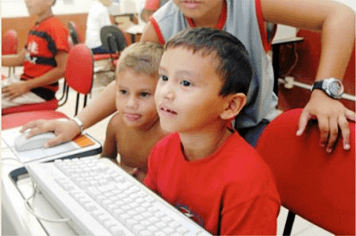
CDI: Transforming lives through technology
The digital revolution is transforming the world, stimulating huge social and economic advances. However, 75% of the world’s population remains digitally excluded. CDI understood the risks of digital exclusion early on and its potential to limit participation in economic, political and social life. In 17 years CDI has impacted more than 1.45 million lives through technology education at the CDI community centers. CDI work generates long-term digital inclusion, where individuals and communities understand how to use technology to bring about positive transformations to their lives.
Impact
In 17 years CDI has directly impacted more than 1,45 million lives. According to external impact evaluations, 87% of CDI students said their lives changed positively through CDI, with 47% of our graduates finding a new job; 34% increasing their income and 12% opening their own businesses. Amongst those enrolled in formal education, 86% stated that their performance at school improved, while over 75% of students found that their reading and writing skills improved.
Beneficiaries
Low income communities, the underprivileged and digitally excluded people in Brazil, Argentina, Chile, Colombia, Ecuador, Mexico, Peru, Spain, United Kingdom, United States, Uruguay and Venezuela.
Sustainability
At the community center level, CDI believes that underprivileged communities themselves are better positioned than governments or companies to decide how to solve the problems that affect them locally. This approach places a premium on shared responsibility and local ownership, entrusting community members to manage and coordinate their own schools.
To help our centers reach self-sustainability, CDI codified a series of selling services which CDI Community Centers can offer as part of their work, services such as internet access, CV preparation and CD-burning. CDI has also developed Micro-Enterprise models which can be implemented in the community centers to help foster sustainability. Our three models are Cyber cafés, Computer repair & maintenance shops and Graphics bureaus, in addition to generating revenues, they are designed to complement CDI’s courses and offer the local community a range of low-cost services.
In addition to fundraising through foundations and businesses, CDI Lan is a social business which is being developed to help generate income for CDI’s core not-for-profit work. It is currently a network of over 6,500 internet cafés which act as a distribution channel for financial and educational services that can create a positive impact in low-income communities. Its mission is to strengthen these small businesses so that they can become hubs for development within their local areas.
Innovation
As the pioneer of the digital inclusion movement in Latin-America, CDI was the first organization in the region to use technology to promote the social inclusion of the most disadvantaged in society. CDI’s innovative socio-educational methodology promotes the use of technology as a tool to transform lives and communities through active citizenship. All of CDI’s courses are taught using this 5-step methodology, an approach that combines civic and digital education. Students follow these steps to realise a social action project in their communities, targeting an issue of their choice:
- Read the world
- Research the facts
- Plan a social change action
- Take action
- Evaluate path taken
Going through the steps, CDI´s students are taught how to apply technical skills in order to solve everyday problems, they are mobilized to better understand and improve their everyday realities and to make real changes within their communities.
In the UK, CDI has adapted this methodology to the creation of Smartphone applications. Apps for Good teaches young people to design apps to solve their real-life problems. The course is currently being distributed through UK schools and has been praised by the Minister of Education as the way forward for teaching IT skills in schools. To scale its impact, Apps For Good has open-sourced all its educational contents, which are currently being used internationally.
Scalability
Scaling impact has been at the core of CDI’s strategies since its creation. With presence in 12 countries, CDI´s approach has proven to be highly replicable, applied in both the developed and developing world, in rural and urban areas, with children, youth, adults and the elderly. We believe in the potential of our model to benefit the lives of the 5 billion people digitally excluded in the world today.
CDI’s social franchise model has been the key to our scalability. Through this model CDI establishes partnerships with local organizations such as NGOs, schools, telecentres, in which CDI Community Centres are created. These local organizations manage the centre while CDI focuses on delivering course contents and training the local educator. CDI believes that access is only the first step, providing training in the application of technology is therefore fundamental to scaling our impact. We aim to ensure that underserved communities have not only the means to access the key developments in ICT transforming our societies but the skills and understanding they need to use these technologies to improve their lives and communities. This bottom-up, skills-focused approach means CDI’s core model is highly replicable in different contexts and applied to different technologies.
Source of funding
CDI’s funding comes mainly from the private sector, grants from foundations and in-kind support. CDI’s community center model is also designed to help improve the sustainability of the organization at the grassroots level by means of various income generating strategies.